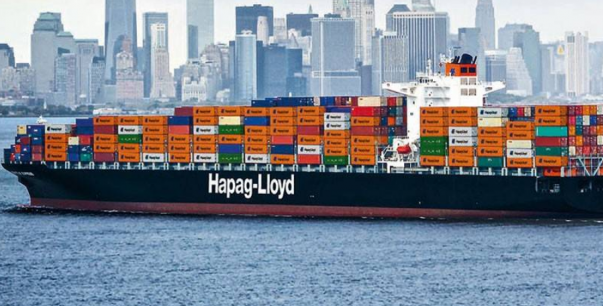ExxonMobil this week signed an agreement with Hapag-Lloyd to supply B30 marine bio fuel oil in the Amsterdam-Rotterdam-Antwerp (ARA) region.
The FAME components were ISCC-certified 2nd generation, meaning that they do not compete for water and agricultural resources used for food production. The fuel, which can deliver a CO2 reduction of up to 87% for the bio-component, offers vessel operators a workable solution when looking to reduce the greenhouse gas emissions from their operations.
FAME (Fatty acid methyl ester) is produced from vegetable oils, animal fats or waste cooking oils by transesterification, where various oils (triglycerides) are converted to methyl esters. This is the most widely available type of biodiesel in the industry and is often blended with regular marine diesel. International standards: ISO 8217:2017, EN 14214, ASTM D6751, EN 590
The marine biofuel delivery in ARA was a 0.50% sulphur residual-based fuel (VLSFO) processed with waste-based fatty acid methyl esters (FAME). The resulting blend met ISO 8217:2017, while the FAME content complied with EN 14214.
Fractions
- The B100 Rotterdam product uses 100% renewable fuel. It has a carbon factor of 2.76
- Another fuel option is B24 (24% renewable) Singapore, which is a blend of used cooking oil methyl ester (UCOME) and standard 380 cSt fuel oil.
- The IMO requires that seagoing barges carry up to B25. Any level higher than this necessitates the use of a chemical tanker. Amsterdam, Rotterdam, and Antwerp (ARA) are excluded since their supply vessels are supposed to be river barges and can deliver up to B100.
In terms of volume, Rotterdam sold 800 thousand Mts in 2022. Singapore began with 70 thousand Mts in September 2022, then doubled that quantity from September to December to 140 thousand.
By boosting our biofuel offer we can now further support the marine industry’s commitment to reducing GHG emissions, in line with the International Maritime Organization’s (IMO) stated ambitions.
… said Aly Abdelmotaal, Regional Marine Marketing Manager, ExxonMobil.
We aim to have net-zero greenhouse gas emissions for our entire fleet by 2045 by using alternative fuels. Bunkering ExxonMobil’s marine bio fuel oil blend is yet another step towards turning our commitment into a reality.
… said Jan Christensen, Senior Director, Global Fuel Purchasing, at Hapag-Lloyd.
To remind, in the past nine months, VT Group and FinCo Group successfully tested 100% Fatty Acid Methyl Ester (FAME) biodiesel on VT Group’s ship MTS Vlissingen.






























































